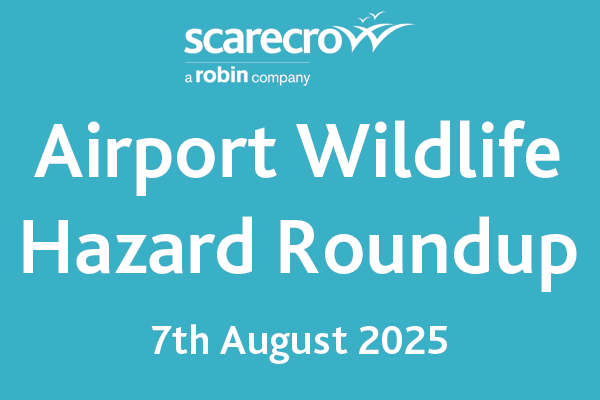There have been a few stories from the world of airport wildlife safety making headlines this past week. Once again, we are here to sum them up in brief so you can easily keep up to date.
Bird Strikes Down in Hyderabad
Rajiv Gandhi International Airport (RGIA) in Hyderabad, India has reported a significant drop in bird strikes. Thanks to the implementation of a new and focussed management plan, the airport recorded 16 incidents in the first half of this year, compared to 43 in 2024 and 48 the year before.
This achievement comes soon after official figures showed that Indian airports report three bird strikes a day. Though RGIA was not among those recording the highest numbers of strikes, it did face challenges due to nearby waste processing sites attracting birds to the area.
The steep decline in bird strikes at RGIA illustrates the effectiveness of robust wildlife hazard management at airports, with a complete toolbox of deterrents.
Bird Strike Causes Delays in San Diego
An Alaska Airlines flight departing from San Diego for Cabo San Lucas, Mexico on 1st August was forced to immediately return after suffering a bird strike during takeoff. The strike prompted an Alert 2 at the airport, an emergency condition indicating “major difficulty” and causing emergency equipment to be deployed.
Fortunately the plane landed safely and nobody was hurt. However, the incident caused disruption to the schedule, with flights due to depart after the incident experiencing “gate hold and taxi delays.”
The aircraft has been temporarily taken out of service so it can be assessed for damage and, if necessary, undergo repairs before carrying passengers again.
Emergency Landing at Heathrow After Suspected Bird Strike
A Dubai-bound British Airways flight departing from Heathrow last Friday was forced to make an emergency landing after experiencing an engine surge during takeoff. Although unconfirmed, a bird strike was suspected as the cause of the surge.
After completing a fuel dump to achieve safe landing weight, the aircraft promptly returned to Heathrow. Nobody was injured and, in a statement, a spokesperson for British Airways described the decision for the flight to return as “a precaution.”
“The aircraft is designed to safely operate with one engine, and we are following standard safety procedures,” the spokesperson said.
Iberia Aircraft Sustains Damage in Bird Strike
Earlier this week, a flight departing from Adolfo Suárez Madrid-Barajas Airport for Paris sustained structural damage after striking a bird shortly after leaving the tarmac. The flight returned to Madrid after being “struck by a large bird on the front section of the aircraft and on one of its engines,” according to a spokesperson for the flight’s operator, Iberia.
The Airbus A321XLR, which was new and had been in service for under a month, sustained significant damage to its nose cone, as shown in photos released after the incident. It also suffered damage to some of the blades of the affected engine.
As with other bird strikes this week, fortunately nobody was hurt. Iberia was able to arrange a replacement jet to carry the passengers to Paris, arriving four hours behind schedule. The affected jet remains out of service, as of most recent reports, awaiting potentially costly repairs.


